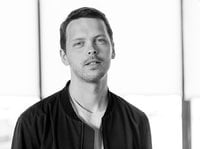Artek’s 124° is a collection of sculptural mirrors that play with light and reflections. Designed by Daniel Rybakken, the mirrors have been named after their distinctive shape: two sheets of thin, polished steel meet at a 124-degree angle. The use of steel sheet makes the structure of the mirror frameless, unbreakable and extremely thin. The 124° collection features three mirrors in different sizes, which can be either mounted on a wall or used as freestanding objects. Plus, the medium version comes with a small wooden shelf that appears round when viewed via the mirror.
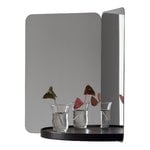
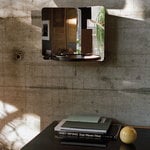
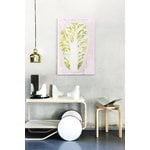
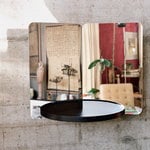
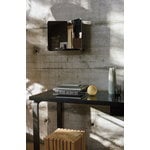
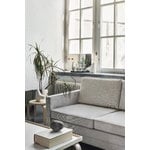
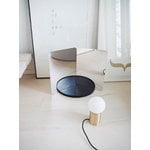
124 degrees mirror, medium, black shelf
Artek
Description
Artek’s 124° is a collection of sculptural mirrors that play with light and reflections. Designed by Daniel Rybakken, the mirrors have been named after their distinctive shape: two sheets of thin, polished steel meet at a 124-degree angle. The use of steel sheet makes the structure of the mirror frameless, unbreakable and extremely thin. The 124° collection features three mirrors in different sizes, which can be either mounted on a wall or used as freestanding objects. Plus, the medium version comes with a small wooden shelf that appears round when viewed via the mirror.
Product details (5)
- Material
- Polished stainless steel, lacquered ash
- Width
- 42 cm
- Depth
- 18 cm
- Height
- 35 cm
- Notes
- Please notice that steel sheet differs from glass mirror by its optical quality and the possibility of small flaws in the surface.
- Product ID
Designer
Daniel Rybakken (born 1984) is a Norwegian designer, who lives in Gothenburg, Sweden. He studied design at the Oslo School of Architecture and the School of Arts & Crafts in Gothenburg. In 2008 Rybakken started his own practises in Oslo and Gothenburg. His work occupies the area between art and design and the theme is often daylight and its recreation artificially. He has received numerous awards, including Red Dot Award (2007), Bruno Mathsson Award (2011), Compasso d'Oro (2014 and 2016) and Wallpaper* Design Award (2017).
View all productsReviews (0)
Sustainability
The Product Sustainability Framework, our criteria of sustainable design, helps you find the most sustainable products in our selection. Read below which sustainability criteria this product has met.
Working conditions & labour 7/9
-
Equal opportunities for all employees
-
Commitment to UN Global Compact, fair compensation for all employees
-
Corporate responsibility requirements defined and communicated for suppliers
-
Systematic work for improved inclusion and well-being in the workplace
-
Transparent supply chain
-
Suppliers' compliance to a code of conduct ensured
-
Compliance to the UN Guiding Principles on Business and Human Rights ensured in the supply chain
-
Direct suppliers audited and certified
-
Support for community involvement in the supply chain
Eco-friendly production 7/9
-
Fair and resource-wise water-use in production
-
No incineration or landfilling of returned items
-
No use of endangered species as materials
-
No direct environmental emissions or waste (excl. GHGs) from production
-
Production and material sourcing that respect biodiversity, animal rights, and natural ecosystems
-
Material-efficient and ecological packaging
-
No potentially harmful chemicals used in own production
-
The sustainability of direct suppliers' production is addressed and monitored
-
Positive impact on nature’s well-being through operations that regenerate natural ecosystems
Climate impact 5/8
-
Company's direct greenhouse gas emissions identified and commitment to reduction
-
Product's carbon impact identified and commitment to reduction
-
Guidance on energy- and eco-efficient use of the product
-
Contribution to climate initiatives beyond the brand’s direct operations
-
100 % renewable energy in own production and operations
-
Low-carbon or compensated transportation
-
Carbon footprint of the product calculated and goals set to reduce it
-
Carbon neutral or carbon negative product
Sustainable materials 6/6
-
Sustainable and long-lasting material choices
-
No harmful or hazardous substances
-
Responsible raw material sourcing and production
-
Materials suited for circularity: monomaterials, recyclable finishings, renewable or recycled contents etc.
-
Ecological materials: natural, biodegradable, recyclable or recycled contents
-
Outstanding materials in terms of innovativeness, responsibility, sustainability and circularity: local production or sourcing, 100 % recycled content, C2C-certification etc.
Circular design 5/5
-
High aesthetic quality promoting long-term use of the product
-
Technically durable product design and material choices
-
Design for enduring life-long quality
-
Design and support for product maintenance, repair and upgradability
-
Innovative circular design solutions: circular service system, resale platform, remanufacturing, collection of used products, etc.







